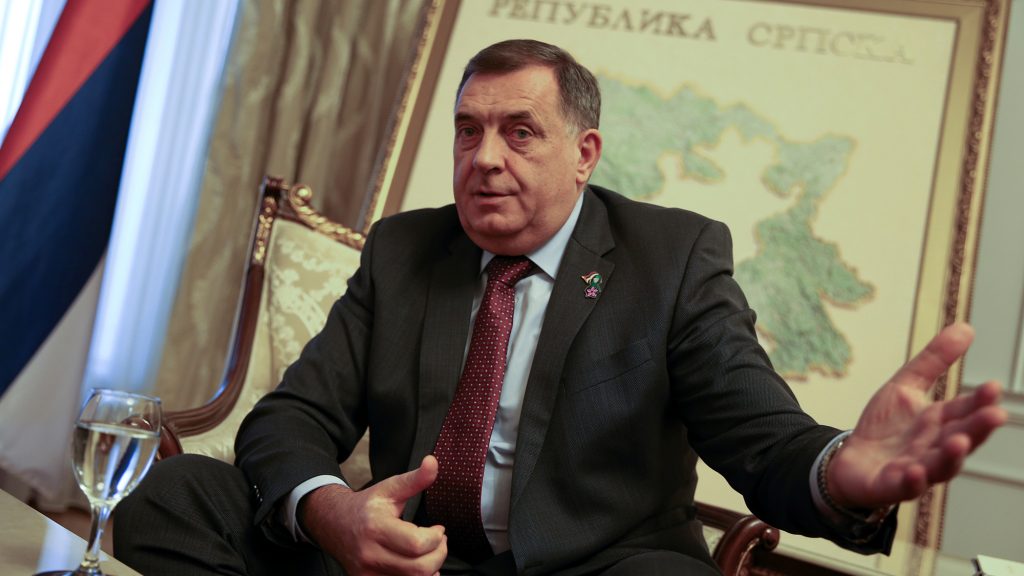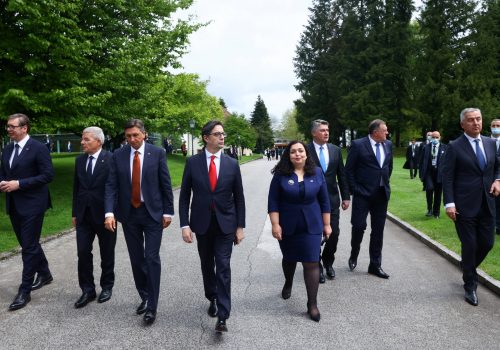Bosnia and Herzegovina is currently experiencing its worst crisis since the 1992-1995 war. The Biden administration this week sent its highest-ranking envoy, Derek Chollet, to the region to explore paths forward. His trip has not resulted in any breakthroughs.
Milorad Dodik, the Serb member of the three-person presidency of Bosnia and Herzegovina and de facto leader of the country’s Serb-majority entity, Republika Srpska (RS), has announced RS’s effective secession, threatening to withdraw it from Bosnia’s central government, armed forces, judiciary, tax and customs agencies, and other state bodies, as well as to establish an independent Bosnian Serb army. These moves, in violation of the 1995 Dayton Accords that ended the Bosnian war, would establish the RS as a rogue state similar to Moldova’s Transnistria and effectively partition the country.
Dodik has been clear about his wish to see the end of Bosnia and Herzegovina since he became prime minister of the RS in 2006. But today, his threats seem more realistic than ever, particularly since he enjoys support from Russia—with the latter having threatened earlier this month to block the annual renewal of EUFOR, the EU’s peacekeeping mission in Bosnia and Herzegovina. Russia has helped train the RS’s police force, which is now armed with military-grade weapons, potentially enabling it to act as a military for the entity. Such moves are part of Serbia and Russia’s wider assault on the international order in Eastern and Southeastern Europe, which also involve threats to Kosovo, the destabilization of Montenegro, calls to unite Serbs across the Balkans via the “Serb World” (Srpski svet), and an escalating Russian presence on the border of Ukraine.
Further, Dodik wants to see the closure of the Office of the High Representative in Bosnia and Herzegovina (OHR), a body tasked with implementing the Dayton Accords and which has traditionally restrained Serb and Croat separatism in the country—even though the office, under incumbent Christian Schmidt (who’s widely seen as soft on Russia) has never seemed more ineffectual. Meanwhile, increasingly vocal right-wing populists in Europe, including Slovenian Prime Minister Janez Janša and Hungarian Prime Minister Viktor Orbán, are sympathetic to RS separatism. Nearby Croatia has also supported the Croat Democratic Union in Bosnia and Herzegovina, which supports Dodik’s goal of dismantling the country.
That’s why the international balance is more likely to tilt in favor of those seeking Bosnia and Herzegovina’s break-up more than at any time since the war ended. This means that no broad multilateral effort to resolve the crisis on a consensual basis is likely to succeed. Anyway, Dodik regularly threatens to scuttle the Dayton Accords in order to extract concessions from the international community. Western leaders regularly appease him, superficially averting immediate crises by fueling the RS’s secessionist drive in the long term.
Naturally, Bosnia and Herzegovina’s international supporters are tempted to call for bolstering the existing international structures—the OHR and EUFOR—to prop up the crumbling Dayton system. But that overlooks the fact that those accords are unworkable because they attempt to reconcile the existence of a multinational Bosnia and Herzegovina with the presence of a Serb sectarian entity that was established on the basis of a genocidal attempt to destroy multinational Bosnia and Herzegovina. This contradiction will always fuel RS separatism. Even Dodik is not an aberration, but instead the inevitable product of the system; he began as a moderate but evolved into a radical separatist. And without a strong international administration—such as through the powerful and proactive OHR that existed under High Representative Paddy Ashdown in the mid-2000s, which took coercive action against troublemakers among the country’s elites and was backed with a strong international troop presence—the RS will inevitably revert to separatism in the future.
Propping up the current crumbling order leaves Bosnia and Herzegovina indefinitely as a powder-keg waiting to explode as soon as the international balance of power is sufficiently upset. Given the current international climate, this may happen sooner rather than later.
It’s time to accept that the Dayton system—which was a stopgap measure to end the war and was never intended to be permanent—has failed to bring stable peace to Bosnia and Herzegovina. Dodik’s moves, including his rejection of international-court verdicts that establish the Srebrenica massacre as genocide, amount to a repudiation of Dayton. With the Serb side so roundly rejecting it, neither Bosnia and Herzegovina nor any other member of the international community is obliged to abide by the terms of the agreement.
That’s why it’s time for the United States, the United Kingdom, and other willing members of NATO to serve the RS leadership notice that, unless it abandons its separatist policies, disarms, and accepts the immediate restoration of a functional Bosnian state, the allies will work with the other members of the Bosnian presidency to introduce a wholly new constitutional order in which the RS would be dissolved. Not only would this send a strong signal to Dodik’s supporters that their leader is leading them off a cliff, but it would also demonstrate to Russia a renewed resolve to confront broader security threats in the region.
The Bosnian question has jeopardized the stability of Europe for nearly three decades. It is time finally to resolve it.
Marko Attila Hoare is an associate professor and head of research for the Department of Political Science and International Relations at the Sarajevo School of Science and Technology.
Further reading
Tue, Nov 16, 2021
Kosovo and Serbia expose the Summit for Democracy’s conundrum
New Atlanticist By
The Biden administration's belated decision to invite both Western Balkan rivals, even though they are on different democratic trajectories, shows the inherent tension: Is this summit all about geopolitics or is it all about democratic values?
Wed, Jun 30, 2021
How Aleksandar Vučić stole the vaccine-diplomacy show
New Atlanticist By Dimitar Bechev
By balancing the West, Russia, and China, Serbian authorities have made impressive headway in inoculating their citizens—and using vaccines as a diplomatic tool.
Wed, Jul 29, 2020
Western Balkans leaders meet to drive coronavirus recovery and deepen regional economic cooperation
New Atlanticist By
Leaders from the Western Balkans Six—Albania, Bosnia and Herzegovina, Kosovo, North Macedonia, Montenegro, and Serbia—participated in the Western Balkans Partnership Summit on July 29 to take steps to deepen regional economic cooperation and stimulate growth amid the widespread economic downturn caused by the novel coronavirus (COVID-19) pandemic.
Image: Milorad Dodik, Serb member of the Presidency of Bosnia and Herzegovina, speaks during an interview in his office in Banja Luka, Bosnia and Herzegovina, on November 11, 2021. Photo via REUTERS/Dado Ruvic.



